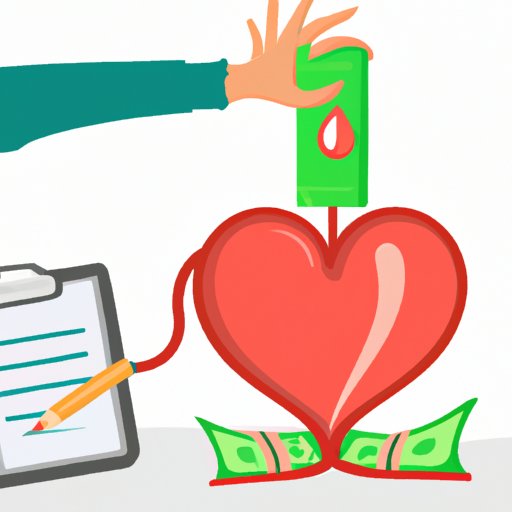
Introduction
Donating blood is a voluntary act that has the power to save lives. Every day, blood transfusions are necessary for surgeries, cancer treatments, and other medical emergencies. However, in the United States, blood donations are not compensated across the board. So, are there options to get paid for donating blood? In this article, we will explore various compensation options for donating blood and the ethical considerations and financial benefits involved.
The Process of Donating Blood
The first step in donating blood is to find a local donation center. Donors must fill out a health questionnaire and pass a physical exam to ensure they meet the eligibility requirements. These requirements include being 17 years old or older, weighing at least 110 pounds, and being in good health.
After clearing the initial screening, blood donation involves a simple process. Donors usually sit or lie down while medical professionals collect a unit of blood. The entire process usually takes between 30 and 45 minutes.
Compensation Options for Donating Blood
While many people donate blood out of the goodness of their hearts, there are options for compensation. Some blood donation centers offer paid donation programs where donors receive financial compensation for their donations. These programs often involve more frequent donations over a period of time. For example, some programs pay donors up to $50 per donation and allow them to donate up to twice a week.
In addition to paid donation programs, some centers will reimburse donors for expenses related to their donation. This may include compensation for travel or time off work.
The compensation models for blood donation have evolved over time. While some countries, such as Germany and Lithuania, allow paid donation programs, the United States is one of the few countries that relies on only unpaid donors.
Comparing Paid and Unpaid Donation Programs
There are pros and cons to both paid and unpaid donation programs. Advocates for paid programs argue that offering compensation can increase the number of donors and ensure a stable blood supply. Critics argue that paid donations can incentivize those who are not healthy enough to donate, and therefore put the blood supply at risk.
Those who have participated in both paid and unpaid donation programs often have their own perspective on which is preferable. Paid programs may allow for more frequent donations and ease the financial burden on the donor. However, unpaid programs often offer a sense of altruism and community involvement without the possibility of financial gain.
Ethical Considerations of Compensating Donors
The ethical implications of compensating donors for their blood donations are complex. Some argue that offering financial compensation can potentially exploit individuals from low-income or vulnerable populations. Additionally, concerns have been raised about the safety and quality of the blood supply if individuals are incentivized to donate without meeting appropriate health requirements.
Despite these concerns, others view compensation as a fair tradeoff for valuable resources. Blood donation requires a significant commitment of time and resources, particularly for frequent donors. Compensation may be viewed as a way of acknowledging and appreciating these efforts.
Financial Benefits and Drawbacks of Donating Blood
While the act of donating blood is often seen as a selfless act, there are financial costs associated with the decision. These costs may include transportation expenses, time spent at the donation center, and any associated medical costs.
Donors who participate in paid donation programs may be compensated for their time and effort, which can lessen the financial burden. However, those who participate in unpaid programs may be able to write off expenses as a charitable donation on their tax return. Evaluating the potential financial benefits and drawbacks of both paid and unpaid programs is important for any individual considering donating blood.
A Brief History of Paid Donation Programs
The compensation models for blood donation have changed over time in response to supply and demand issues. In the 1930s, blood donation began as a completely voluntary process with no compensation offered. However, during World War II, the need for blood dramatically increased, leading to the establishment of paid compensation programs.
Today, many countries rely on a combination of paid and unpaid donation programs to ensure a stable blood supply. In the United States, unpaid donors currently provide the majority of donated blood. However, some centers have experimented with paid programs as a way of increasing the donor pool.
Personal Insights into Blood Donation
For many individuals, the decision to donate blood is personal and deeply meaningful. Hearing the stories of others who have donated blood and their experiences can be illuminating. Some donors report a sense of pride and purpose in their donations, while others find the experience physically and emotionally draining. The role of compensation in the decision to donate is also an important consideration.
Practical Guidance for Donors
For those who are interested in donating blood, there are practical considerations to keep in mind. It’s important to research donation centers carefully and ensure they have a strong track record of safety and quality control. Additionally, researching different compensation models and evaluating any potential financial benefits and drawbacks is vital. Ultimately, the decision to donate blood should be based on personal values and circumstances.
Conclusion
Donating blood has the power to save lives and make a difference in the world. The decision to donate can be deeply personal and meaningful. Exploring the various compensation models for blood donation is an important aspect of making an informed decision. Whether you participate in a paid or unpaid program, the act of donating blood is a selfless and admirable choice.





